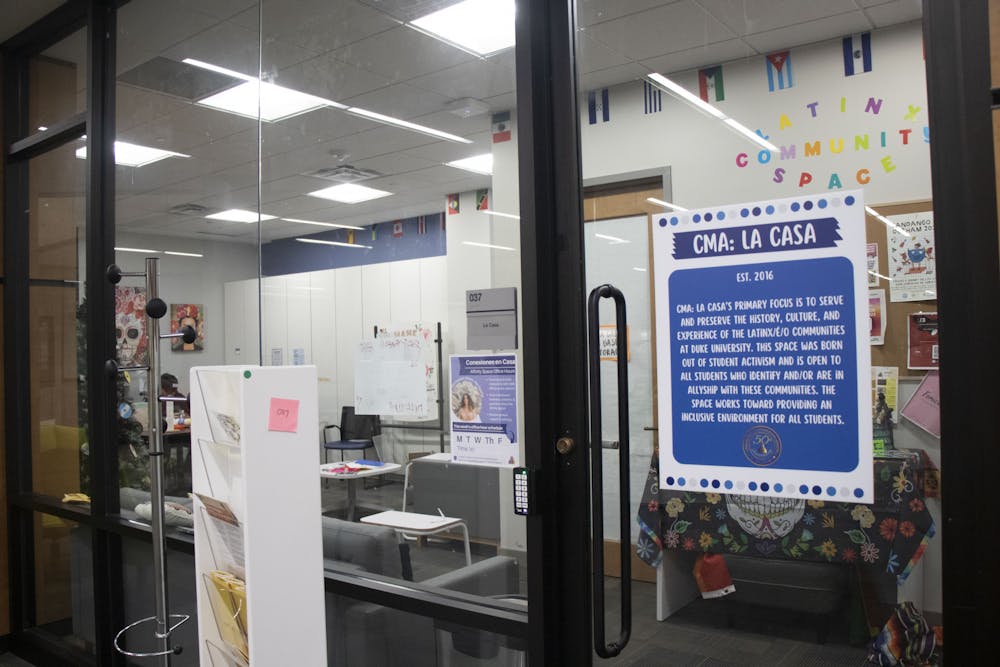This is part five in a series profiling the identity centers and groups at Duke, highlighting the work they do and their roles on campus. Part four, which focuses on the International Student Center, can be found here.
From organizing heritage month programming to advocating for student needs, Mi Gente has created a community for Latinx students on-campus for the past three decades.
Junior Anthony Salgado, president of Mi Gente, describes the group as “one of the only spaces on campus where you can be accepted no matter who you are.” He recalls struggling to find community during his first year at Duke. He feels Mi Gente has not only helped him find it, but also given him the opportunity to provide that experience to others.
According to Salgado, Mi Gente’s programming and mentorship have been critical to accomplishing this. Part of this programming includes Mi Gente’s efforts in creating a Latinx Heritage Month calendar, in collaboration with other Latinx organizations and the Center for Multicultural Affairs.
“Duke is one of the only schools that doesn’t have school-designated programming for their heritage months. A lot of the time, it’s on cultural groups to make those go,” Salgado said.
Junior Nicole Romero Ospina, vice president of Mi Gente, organizes Mi Gente’s mentorship program, known as the “familia program.” First-years can apply as “children”, with sophomores, juniors and seniors applying to be their “parents.”
Before family selection occurs, Mi Gente holds speed dating events for “children” to meet their prospective “parents.” The goal is for Latinx freshmen to have a support system during their time at Duke.
“Being a minority coming into college, you don’t really know your way around. So it’s great to have somebody who can lend a hand and lead you through it,” Romero Ospina said.
As a “child,” Romero Ospina says her “co-mothers” acted as guides, from nominating her to apply for Mi Gente’s executive board to creating PorColombia — Duke’s Colombian student community — together and helping her navigate academic endeavors as an undecided first-year.
Last year, Romero Ospina had “a son and a daughter,” and felt especially close to her “son” due to their similar career and major paths.
“I’ve gotten to help him through everything that is Duke stress … it’s been great being on both sides,” Romero Ospina said. “It’s good to know that you have a support system, even if you don’t always need to use it.”
Families also get to compete in the Family Olympics, a Mi Gente tradition that pushes families to bond more by competing with other families. According to Romero Ospina, past events included making creative TikToks with one’s family, seeing which family can do the most pushups in a minute and other fun challenges.
Prior to establishing this support system, Mi Gente reached out to new students through the Latinx welcome reception. Salgado further noted informal steps Mi Gente takes to engage with new students, such as creating a group chat for Latinx first-years to receive support from all Latinx organizations and their executive boards, as well as distributing physical flyers.
As publicity chair, sophomore Lauren Valle has seen a significant increase in engagement in Mi Gente social media and events, from last year’s range of 30 to 50 attendees spiking to hundreds this year.
“You could definitely see that reflected in how crammed La Casa was in the first few weeks,” Romero Ospina said. “There was nowhere to sit.”
While Valle credits events for “getting [Mi Gente’s] name out there,” she says La Casa, a physical space for all Latinx organizations, has been Mi Gente’s strongest way to create relationships.
According to Romero Ospina, La Casa was her “safe space.” It was difficult for her to see La Casa be relocated in summer 2022. While the new La Casa, half the size of the old space, doesn’t feel the same as Mi Gente’s old home to Romero Ospina, she said she’s happy to see first-year students “making it their own home [and rising] up to the situation.”
Salgado, however, is calling for more, citing Latinx organizations’ past demands for a Latinx center.
“[Duke’s] peer institutions have a Latinx center. [Duke’s] peer institutions have resources specifically for Latinx students. It does not make sense that Duke doesn’t have those things,” Salgado said.
Other demands include a Latinx studies department with a major and minor, a President’s Council on Latinx affairs, and increases in Latinx faculty and staff representation. In hopes of maintaining awareness of these demands, Salgado says Mi Gente has introduced recordkeeping of historical aspects of Latinx identity at Duke.
The goal of this practice is to maintain the consistency of the nine demands.
“We want a Latinx center. How many decades has that been asked for now?” Salgado said. “We don’t need to write a new demands list every year. Make sure those nine get done and until those nine get done, we’re not stopping.”
Valle says that this requires a lot of student labor and credits the executive team’s passion and the energy of new and active members for helping them persist.
“The beauty of Latinidad and Latinx students, Hispanic students, Latin American students, Latino students, Latina, Latin — whatever you want to call it — is that we are so diverse in our experiences. There’s so much intersectionality,” Salgado said. “[Mi Gente] is everything because that’s the nature of our culture, and anyone is welcome to it.”
Get The Chronicle straight to your inbox
Signup for our weekly newsletter. Cancel at any time.

Ayra Charania is a Trinity junior and a senior editor of The Chronicle's 118th volume.

